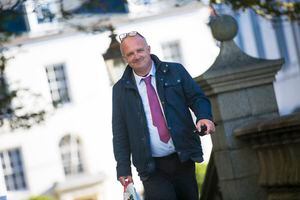Vital debate about tourism is stifled by political gagging
Fallout from comments made about Visit Guernsey on the radio by Deputy Neil Inder suggests that, above all, the States wants to avoid any sign of conflict, no matter what the circumstances. But the way Marketing and Tourism spends its £2.5m. budget needs to be debated and senior civil servants cannot expect to be immune from any resultant public criticism

STATES members have all been put on notice – publicly criticise a team of civil servants in the media and you will face sanction.
And that is extremely troubling.
Deputy Neil Inder was found in breach of the States members’ code of conduct for comments made in particular about Visit Guernsey during a radio interview.
In its ruling, the panel said that members who wish to criticise civil servants should adhere to the ‘correct practices and procedures’ – whatever they may be is unspoken – but that in particular he did not afford the civil servants concerned respect and courtesy because he publicly criticised them in the media in circumstances in which they were unable to respond.
You have to ask yourself, were they really unable to respond? Have they been rendered mute, and if so, why?
There are any number of ways to get your views heard nowadays, and many of them are instantaneous, and numerous ways to contact the media to have your say.
Indeed, if anyone knows about handling the media, it is a team responsible for promoting the island.
So could the Visit Guernsey team have responded? Yes.
Are well-paid senior civil servants more than capable of holding a viewpoint and articulating it in public? Yes. Well, they should be.
Should underperforming deputies or senior civil servants be held to account in public? Yes.
Do all the codes and guidelines set out for politicians and staff allow this to happen? Clearly not.
Often it feels like this is a States that, above all, wants to avoid any sign of conflict, no matter what the circumstances. It is all about presenting a unified and sanitised corporate image.
Deputy Dawn Tindall going forward with her code of conduct complaint against Deputy Inder is a sign of that.
It is naturally a difficult balance to strike.
Somewhere between a dangerous silence and unreasoned trolls shouting, abusing and offending is quality debate and accountability.
Deputy Inder has accepted a caution, a minor slap on the wrist, there was little else he could do, while being cleared of making derogatory comments about Deputy Tindall because they were not actually aimed at her.
What this has done is overshadow a legitimate debate about the tourist sector and what is being done to grow and support it – is Visit Guernsey and the Economic Development board performing?
This committee has been working on a new tourist strategy for years. Until we see that published, the benchmark we have to use is the tourism plan that was drawn up by the director of marking and tourism alongside members of the Chamber of Commerce – and approved by Economic Development’s predecessor Commerce and Employment, for 2015 to 2025.
It lays out growth targets from various schemes and what level of impact each will have on GDP.
There was a big positive fuss made about this plan at the time – but too little has been heard of it since, which is always a cause for concern.
Deputy Inder is now trying, through a series of official written questions, to extract more evidence about how successful or otherwise that plan and Visit Guernsey has been, as he builds the case for taking a look at whether there’s a better way of promoting the sector.
Near the end of 2017, Economic Development answered an information request from this newspaper for the action plans the tourism plan trailed and the evidence of the impact they had – an example was given in the plan of spending on a TV campaign that would increase visitor numbers by 3% and add £3.2m. to GDP.
It made the plan seem like a fully-costed, evidence-based piece of work, a serious shot at economic growth with an idea of how to get there – it was called a ‘strategic plan’ to give it a bit more gravitas, perhaps.
But scratch beneath the surface and it was nothing of the sort – it was a conjurer’s trick.
‘The volume and value and timeframe objectives were not specific targets scientifically arrived at, they were agreed as “broad order of magnitude” assessments of costs and likely benefit which would help to set relative priorities,’ the committee answered.
It also stressed that the tourism strategy was never endorsed by the States and was largely a ‘legacy document’ the committee had inherited.
Economic Development pledged to bring a new tourism strategy to the Assembly as soon as possible.
It still has not.
Back when the 2015 to 2025 plan was being promoted, when it spoke about visitor numbers and growth objectives it excluded the cruise ship and visiting yachtsmen figures, which at the time were falling.
Visit Guernsey has changed that narrative now – in its analysis of the 2018 figures, the first number it pulls out is total visitors, including cruise ship passengers and visiting yacht crews.
Doing so meant it could report a slight increase.
But, as it acknowledges, excluding them left 280,475 visitors, a fall of 3% or 8,984.
It makes no mention of the tourism strategy goal, target, objective, whatever you want to call it, but by 2020 there were meant to be 350,000 visitors by this measure, adding £14.8m. to GDP.
That is simply not going to happen.
Marketing and Tourism has a £2.5m. budget.
There is a very real debate to be had about whether that is enough and whether it is being spent in the right way.
Economic Development should not have been stuck with a legacy document it clearly does not believe in for so long – that it has been allowed to drift like this with no alarm bells ringing is not a great endorsement. Where, for example, has Scrutiny been in all this?
This matters even more with Economic Development and Policy & Resources currently thrashing it out over a runway extension and what to do with sea links.
In the Field of Dreams scenario, if you build it, they will come.
But will they? Or have they already gone elsewhere?
A runway extension alone would be a waste of money if it was not supported by a coherent – and believable – strategy for growing a tourist sector that is in decline.
That is where the focus should be – not on gagging political criticism.
Many deputies campaign on their desire to ensure efficiency and good performance in the public sector – and the voters expect it.





